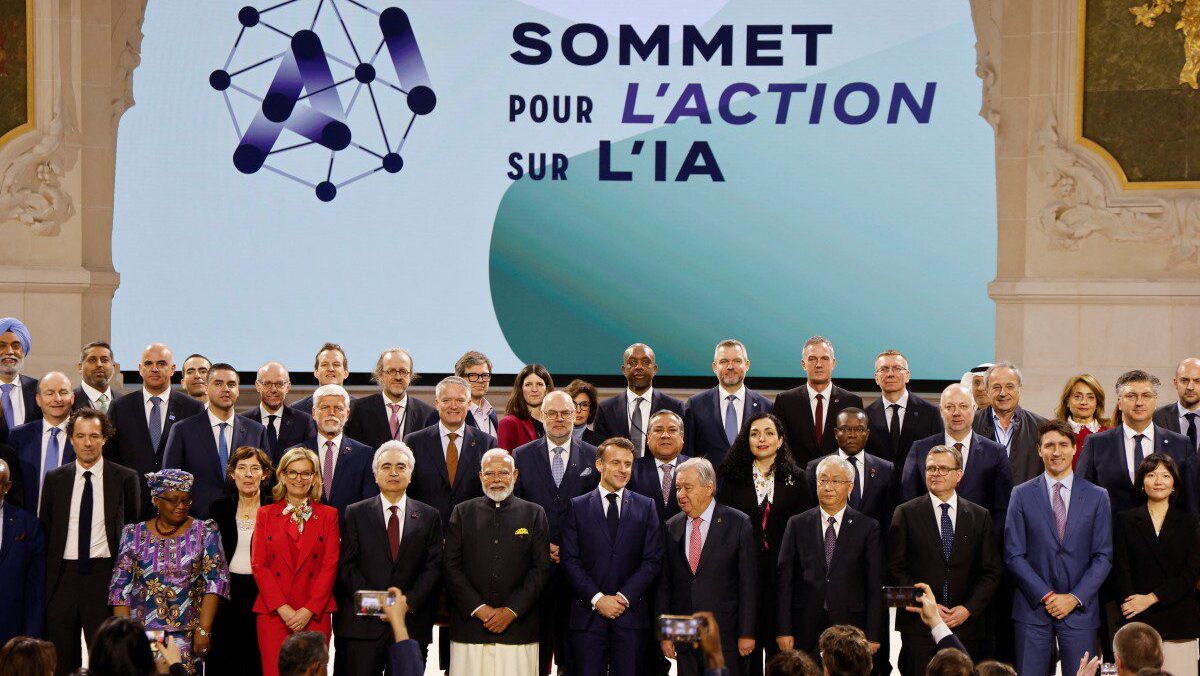
World leaders and attendees at the end of the plenary session of the Artificial Intelligence (AI) Action Summit, at the Grand Palais, in Paris, on February 11, 2025.
Photo: Ludovic MARIN / AFP
In the final phase of the Paris summit on artificial intelligence (AI), European Commission President Ursula von der Leyen took the floor to announce a massive investment plan in the European AI sector, to the tune of around €200 billion.
A central concern for innovators—and, outside Brussels, free speech advocates—is the European Union’s regulatory approach to the emerging technology.
Von der Leyen—who demanded the right to speak alone at the summit on artificial intelligence on an equal footing with US Vice President JD Vance—took the floor on Tuesday, February 11th, before an audience of heads of state and tech executives gathered at the Grand Palais in Paris. She announced a commitment of more than €200 billion over the next few years.
The exact origin of the funds committed is not yet known. These are mainly private funds: von der Leyen describes it as “the world’s largest public-private partnership for the development of trustworthy AI.” Some €50 billion will be provided by the European Union, although it is not yet known how these sums will be collected. The remaining €150 billion will come from around 20 major international financial players, including American and European investment funds approached by an alliance of European companies, the EU Champions Initiative.
This collective, which brings together major industrial groups (Airbus, L’Oréal, Mercedes, Siemens) and such technology companies as Spotify and Mistral AI, presents its mission in a press release and states that it wants to “cooperate with the European Commission and the member states to create a drastically simplified regulatory framework for AI, in order to unlock innovation.”
The funds raised in this way must be spent within the next five years. The issue of regulation is at the heart of the negotiations with the investors, who explain that the sums will only be paid once “Europe has succeeded in creating a competition-oriented, transparent and targeted roadmap for AI, with viable investment opportunities.”
The speech by US Vice-President JD Vance on Tuesday, February 11th emphasised the need for deregulation, seen as a sine qua non for any ambitious technology policy.
At the conclusion of the Paris summit, an international declaration was published, signed by some 60 countries represented, as well as by the EU and the African Union. It is a declaration of principles aimed at the development of an “open,” “inclusive” and “ethical” AI. China and India have signed the declaration, but the United States has refused to join because it rejects the “ideological bias” induced by international cooperation on the subject of artificial intelligence.
“We believe that ideological bias has no place in AI,” JD Vance reminded—referring to the measures put in place by AI designers to try to reduce the biases deemed racist or sexist that can emerge in artificial intelligence programmes based on the training data collected. The United Kingdom also did not sign the declaration. According to Keir Starmer, it does not comply with national security imperatives. However, the British Prime Minister has indicated that he wants to continue working with France on other issues related to AI. The Paris Summit ultimately led to the establishment of large-scale partnerships with diverse objectives, including:
These numerous programmes, some of which are under the aegis of the UN, bear witness to the stranglehold of globalist international bodies on AI. They seem set to result in the delivery of the ideological bias denounced by JD Vance on such sensitive and politicised subjects as climate change, racism, and gender.
